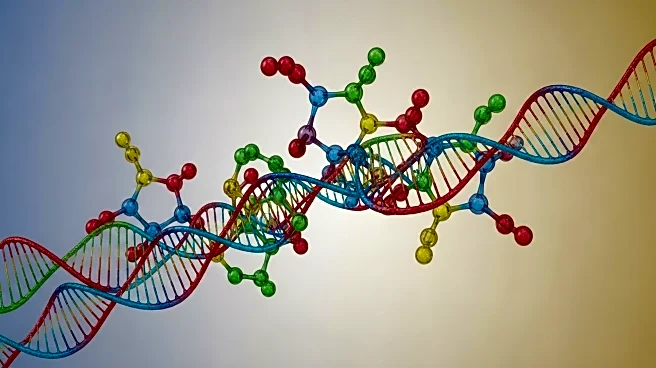What is the story about?
What's Happening?
Chemists at University College London (UCL) have successfully demonstrated how RNA and amino acids, two fundamental biological components, could have spontaneously linked together at the origin of life approximately four billion years ago. This achievement, published in Nature, marks a significant advancement in understanding the early processes of life formation. The study involved chemically linking amino acids to RNA under conditions that might have existed on early Earth, a feat that has eluded scientists since the 1970s. The research team, led by Professor Matthew Powner, utilized a gentler method inspired by biological processes to activate amino acids, allowing them to link with RNA without breaking down in water. This method involved thioesters, high-energy compounds theorized to play a role in the origin of life. The study unites two prominent theories of life's origin: the 'RNA world' and the 'thioester world'.
Why It's Important?
This breakthrough is crucial for advancing the understanding of life's origins and the synthesis of proteins, which are essential for all living processes. By demonstrating how amino acids can be linked to RNA, the study provides insights into the potential mechanisms that could have led to the development of the genetic code and protein synthesis. This research could pave the way for future studies aimed at replicating early life processes, potentially leading to innovations in synthetic biology and biotechnology. The ability to synthesize proteins from simple molecules could have profound implications for clean energy and environmental science, as synthetic organisms might be developed to address energy challenges and environmental issues.
What's Next?
The next steps for the researchers involve establishing how RNA sequences can preferentially bind to specific amino acids, which is essential for RNA to begin coding instructions for protein synthesis. This would further elucidate the origins of the genetic code. The team aims to overcome numerous challenges to fully understand the origin of life, with a focus on the origins of protein synthesis. Future research may explore how these chemical reactions could have occurred in natural settings on early Earth, such as pools or lakes, rather than oceans where chemical concentrations would be too diluted.
Beyond the Headlines
The study highlights the potential for synthetic biology to revolutionize our understanding of life's origins and the development of new technologies. The discovery of thioesters' role in linking metabolism, genetic code, and protein building could lead to significant advancements in molecular biology and biotechnology. This research also underscores the importance of interdisciplinary approaches, combining chemistry, biology, and environmental science to address complex scientific questions.
















